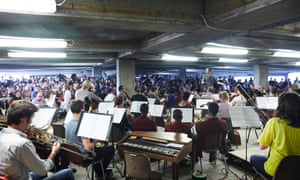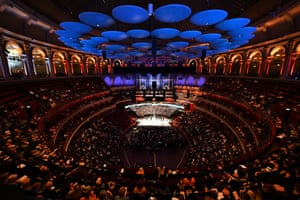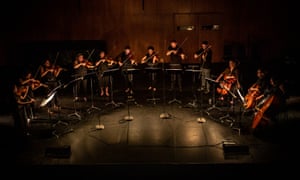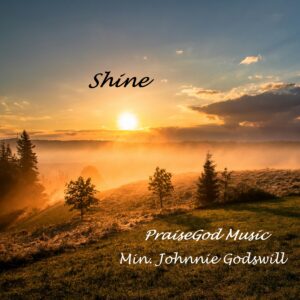

From top to bottom, from big to small, from freelancer to staffer, from humble hall to grand auditorium, the world of classical music is facing its biggest crisis in living memory. Most musicians in the UK work freelance, even members of many big-name orchestras, so for them no gigs means no earnings. Some qualify for help for the self-employed, but many don’t. Conservatoires – employers of musicians, producers of future talent – are facing a financial crisis as overseas students stay away. All the backroom people who usually keep the show on the road, from agents to publishers, are haemorrhaging money. Concert halls and opera houses cannot earn.
In London, the Royal Albert Hall and the South Bank have warned of imminent catastrophe. The Royal Opera House can keep going “for a few months”, says its chief executive, Alex Beard. But when your art form is “a hundred people on stage, a hundred in the pit and 2,700 in the audience”, when your financial model means you break even when you sell 95% of your tickets, when public subsidy accounts for only 20% of your income, rather than 80% as it would in Germany, it is obvious that you are going to hit the buffers. “In many ways all this is a purification, a chance to start again,” says John Gilhooly, director of London’s Wigmore Hall. “But there is huge anxiety and hardship. Orchestras could be going to the wall in the next 12 weeks.”
There is a deep contrast beginning to open up between the UK and much of continental Europe. For our neighbours, public investment in culture is much greater, and organisations are less reliant on box-office income, so the Covid-19 crisis is not an existential one, as it is in the UK. And there has been silence from the upper echelons of government. “I’m desperately worried for my orchestra in London,” Simon Rattle told fellow conductor Alan Gilbert recently, in a conversation on Facebook. “I’m so scared for the financial hardship that they will be going through.”
The future? …Britten’s opera Peter Grimes staged on the beach at Aldeburgh, Suffolk. Photograph: David Levene/The Guardian
Yet when I spoke to Christoph Lieben-Seutter, artistic director of the Elbphilharmonie in Hamburg, he had a different attitude. “We are not afraid,” he said, “because culture has great importance in the public realm in Germany and we cannot be allowed to fail.” He has announced a full autumn season for the hall, albeit with the proviso that things may change.
This kind of recovery seems some way off in the UK, notwithstanding the recitals that began in the Wigmore Hall last week, relayed to the ultimate socially distanced audience, the listeners of Radio 3 and viewers online. The performing arts will be among the last activities to be resumed as the UK continues its faltering and divisive progress out of lockdown.
Kathryn McDowell, managing director of the London Symphony Orchestra, tells me she is contemplating a return for the orchestra that might involve hour-long concerts, performed twice in an evening to a socially distant audience, with the hall cleaned in between. Others, including John Summers, the outgoing managing director of the Hallé in Manchester, think differently. “It’s time to batten down the hatches,” he says. “Doing concerts to small numbers of people can’t do anything but lose you money.”
Martyn Brabbins, music director of English National Opera, isn’t alone in voicing an urgent need to get going as soon as possible. “We have a wonderful orchestra, chorus, lighting and tech team – everyone we need to make an amazing series of events,” he says. “It would be irresponsible and lazy not to be trying to do something.” The company is planning a drive-through La Bohème at Alexandra Palace in London.

A car park concert in Peckham … ‘The idea that music of high stature has to be performed in buildings of high stature closes things down,’ says Kate Romano. Photograph: Ambra Vernuccio
There is no consensus: but having houses only 20-30% full, as is being planned for socially distant performances in Europe, is economically impossible in the UK without a huge injection of government support. Beyond that bald fact are dozens of intricacies. What to do about the toilets? What to do about the bar? Will audiences pay full whack for a short concert? Will they come at all, particularly those who are older? What do you do if you tour to multiple venues, each with their own distinct insurance arrangements? And how would you travel? What do you do if you are based in Wales, but tour to England, where regulations are different? What do you do about evidence of the spread of the virus by aerosolisation? Spit, not to put too fine a point on it, is the inevitable byproduct of singing and brass.
This crisis is largely hidden from the public. No great figures of the music world have spoken out publicly; the only remarks to have made the headlines have been Prince Charles’s anguished mumblings, in an interview with Classic FM, about the importance of the Royal Opera House. By contrast, figures in British theatre, who face many similar problems, have been much more adept at raising awareness. Many – directors Rufus Norris and Vicky Featherstone, producer Sonia Friedmann, playwright James Graham and more – have been writing articles and appearing on TV and radio for weeks.
The classical music world in the UK is used to being on the defensive, each part conserving its own precious inheritance from the past. Theatre, however, is used to creating new narratives. “We’ve been banging on about the crisis in classical music for ages,” says clarinettist and producer Kate Romano. “The drop in provision of GCSE music, the ageing audience. Now we’ve really got a crisis, it’s just not the one we thought we were going to have. Maybe it’s not the pandemic that’s the real crisis. It’s underlying things in the way we operate. We could be looking for something better now – if we have the guts to talk about it.”

Extravagant … John Luther Adams’s In the Name of the Earth at the Proms involved eight choirs and more than 600 singers. Photograph: Mark Allan
The environment, for example, has become an urgent new focus of conversation, given how the deeply damaging airport-to-concert-to-airport lifestyle of classical’s jetset has juddered to an emergency stop. “The days of all these orchestras going over the globe – this is unthinkable,” said Rattle. John Summers of the Hallé says touring – sticking 90 musicians and their instruments on a plane to somewhere that already has an orchestra of its own – is a form of “vanity publishing”.
Of the LSO, McDowell says: “We might limit long haul to once a year. For Europe, a single long trip by train. It would be better for everyone’s health and wellbeing.” John Gilhooly, who runs the Wigmore Hall, says that instead of having a pianist like Igor Levit come to and from London several times a season to perform a series, he is thinking of inviting him for a single, concentrated period. Which seems blazingly obvious, once you think about it.
Levit has been one of the musicians who has poured out his soul online, posting performances on his Twitter feed during his lockdown in Berlin. Audiences have felt attracted to this candid kind of music-making, so intimate, so humanly and grittily imperfect. Stripped of the usual ritual around concerts, such performances have seemed to get closer to exposing the raw stuff of music itself than many a sleeker, more formal production.
How to raise significant amounts of money in the online realm is an unanswered question, but many musicians and institutions are beginning to conquer an aversion to what is often seen as a secondary medium. Income from streaming services such as Spotify, though, is a bad joke. Violinist Tasmin Little recently told Radio 4 she has earned, from more than 5m streams, the princely sum of £12.34.

Well positioned … organisations such as Manchester Collective already perform in non-traditional spaces. Photograph: Victor Frankowski
“We’re getting around 200,000 streams of our content a day,” says David Burke, managing director of the London Philharmonic Orchestra. “Our income from this comes out at about £30,000 a year. That would pay for rehearsals for a single broadcast.” Composers and performers get stung because streaming services don’t take into account the length of a track. From a two-minute song to an hour-long orchestral piece, the payment is the same.
The immediate future for classical music may be radically local, with small groups of musicians bringing their art to communities outside of traditional concert halls. There is plenty of good, old-fashioned precedent here: Benjamin Britten in Aldeburgh, Suffolk; Peter Maxwell Davies in Orkney. This could be a wholly positive thing. “The idea that music of high stature has to be performed in buildings of high stature closes things down and prevents people from thinking about different ways of people hearing music,” says Romano.
People who imagine we will come back the same are deluding themselves
Simon Rattle
Some organisations are already there, poised and ready, because such an approach is in their blood. Manchester Collective, which often performs in non-traditional spaces, is contemplating a new project combining digital and live, adaptable to fluctuating health regulations. The BBC, too, will play an important role in the gradual recovery, bringing live music into audiences’ homes before it is safe for people to congregate.
Many in classical music foresee no return to the old ways. “The people who imagine we will come back the same are deluding themselves,” Rattle said. The next weeks and months could be immensely painful but, with the right government support and the right intelligence, the way music finds and touches audiences could change for the better.
“This big thing that we do is made up of so many small rules that have become normal,” says Rakhi Singh, music director of Manchester Collective. “But nothing we humans do is normal, really. The sun rising in the morning is normal – but anything that human beings do can be changed.”





